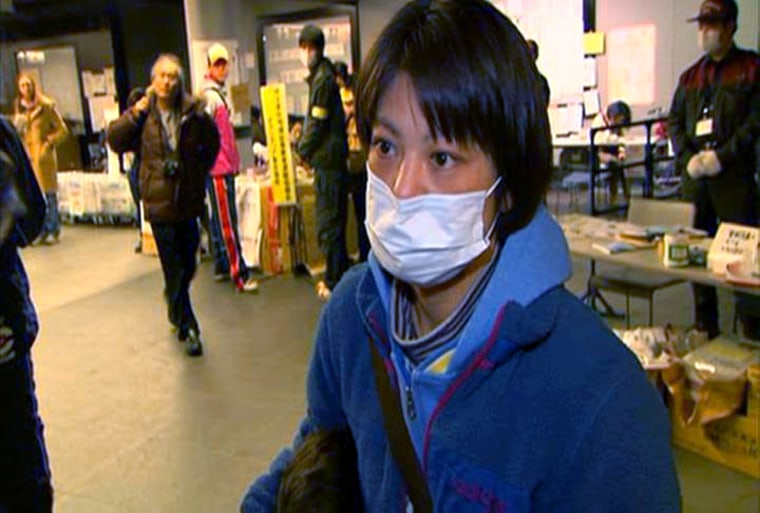Japan's devastating earthquake and tsunami largely spared Junko Ooigawa's family home, but radiation spewing from the crippled Fukushima nuclear power plant may keep her away from it forever.
The radiation also poses a strong danger for her husband, Tsutomu, a technician working to repair the Fukushima plant.
"We do not know if we can ever go back home to live," Junko Ooigawa said. "I cannot imagine the future at this moment."
At the moment she and her child, 5-year-old son, Atsushi, are among 2,300 evacuees, mainly from Fukushima, staying at the Saitama Sports Arena, normally home to concerts and sports events and about 160 miles from Fukushima.
"We are in a situation that we need to start thinking ahead and making some serious decisions for our future," Junko Ooigawa said.
The Ooigawa home of the past 13 years is about six miles from the Fukushima nuclear plant, she said.
"A few roof slates were damaged, but the house itself is still there," Ooigawa said.
She'd like to return home if she has a choice, but the radiation leaks are keeping her put.
"If it was just the earthquake, I do not think I would have been worried," Ooigawa said. "However, since then, the crisis at the nuclear plant, I became worried."
That's not how she felt raising her kids in Fukushima Prefecture.
"Although there were earthquakes in different areas of Japan, for some reason I always felt safe where I lived," she said. "Although there is a nuclear plant nearby, I never thought of such risks."
The morning after the March 11 earthquake, radiation danger mounted as reactors at the nuclear plant shut down and cooling systems failed. Explosions and ventings of reactor buildings sent radioactive smoke and vapor into the air.
"We were given a mandatory order to evacuate to Kawauchi," about 10 miles from the Fukushima plant, she said. "Thereafter, we moved to a place called Kawamata, where my relatives live." That's about 30 miles northwest of of Kawauchi.
Soon after, her relatives and others moved to the Saitama stadium.
"I initially thought I was able to return home," she said. "As I did not expect to be in a situation that I am in now, I did not bring anything with me."
She's also worried about her husband. They can only talk when he calls, which usually is daily.
At first she said, "I was able to see him once and I get to hear his voice daily over the phone, so I am fine."
But she acknowledged concerns about his health. He tells her he is safe but does not reveal details about the situation at the plant.
Some workers have been exposed to as much radiation as 600 millisieverts, equal to several years of the daily exposure limit for plant workers, according to statistics released by Tokyo Electric Power Co. That's about 100 times more than than a typical individual sees in a year from natural sources and X-rays.
High exposure rates can cause cancer and birth defects, burns and radiation sickness.
At the evacuation center, Ooigawa and her son got clean bills of health after a recent checkup.
She wears a mask, though, because a lot of people at the center have caught colds.
She said also they are treated fine by volunteers, there are plenty of supplies and her son is making friends with other evacuees.
"However, I believe a lot of stress remains," said Ooigawa. "I asked my son to do his best, as his father who works at the nuclear plant is doing his best efforts dealing with the current crisis."
